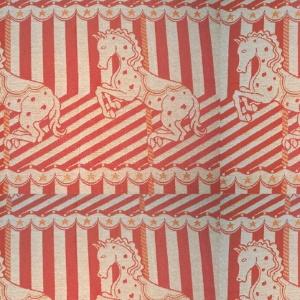 The fabric design featured on the endpapers of the Persephone edition of Family Roundabout.
The fabric design featured on the endpapers of the Persephone edition of Family Roundabout.
Book Review by Ros W: Richmal Crompton is better known for her William books, even though she wrote over forty novels and nine short story collections for adults.
Family Roundabout centres around two families in a country town called Bellington and covers the period from the early 1920s to 1939. The Willoughbys and the Fowlers are brought together by the marriage of Helen Fowler and Max Willoughby. The main characters are the two matriarchs with their differing attitudes to mothering. The Fowlers are down-at- heel gentry while paper mill owners Willoughbys are rich “trade”
Mrs Fowler rules with a “gentle glove” and engages the reader’s sympathy at first. She has the suggestion of loving with uncritical understanding” as her daughter Judy describes her. She is not inquisitive about her adult children’s affairs.
Mrs Willoughby, by contrast, “expected and received implicit obedience from everybody”” and rules with a rod of iron. Mrs F doesn’t pressure her children or intrude in their privacy. Mrs W on the other hand is bossy and interfering but doesn’t see that her downtrodden daughter Cynthia is the only one she deems to be “really satisfactory”.
Mrs F is bookish. Her home, Langley Place, has view overlooking a flower garden and lawn towards the hills. We enjoy the beautiful threadbare furnishings flowers at Langley. On a wet Sunday afternoon she guiltily wishes the family would be put off by the rain and she could indulge in a” long quiet afternoon with her little pile of books”.
Mrs W is a philosopher of the “no novels before tea” school. She keeps the reader at a distance in her “massive solid expensive ugly house.” She is decisive whereas Mrs F is vague, sometimes wilfully, and we enjoy her inner discussions in her head with Millie and Millicent (her more decisive alter ego)
Mrs Fowler’s hands-off approach is more appealing to the reader than Mrs W more autocratic style. The Fowler children all have disastrous marriages, apart from Helen’s which is humdrum.
Mrs F appears indolent and opting out of support. Has she failed hem? “ The shadows seem to be closing around them. And I can’t do anything to help them” she thought “ All I do is sit here and worry.
Mrs W shifts in the reader’s estimation. She is unimaginative though as a mother seemingly kind. She is formidable and controlling everything from the financial control of the mill to the schooling of her grandchildren and the furnishings of her adult children’s homes.
The turning point of the novel comes when she is defied by her granddaughter Jessica. The reader is on Jessica’s side as she is terrified by her grandmother insisting he goes back to boarding school but she overcomes her fear and tells her that she is “a cruel old woman”… I wish I had a someone kind like Mrs Fowler…. Up to now she had the power over her family but her children had been slipping away from her authority.
Mrs Fowler does intervene, but kindly, and persuades Judy to return. The novel is not sentimental or melodramatic . It is very readable with some comic remarks from the elderly Willoughbys.
Dealing with supportive or controlling family environments is a favorite theme of Crompton’s.
Another review of the book, by Kathryn R, can be found here.
